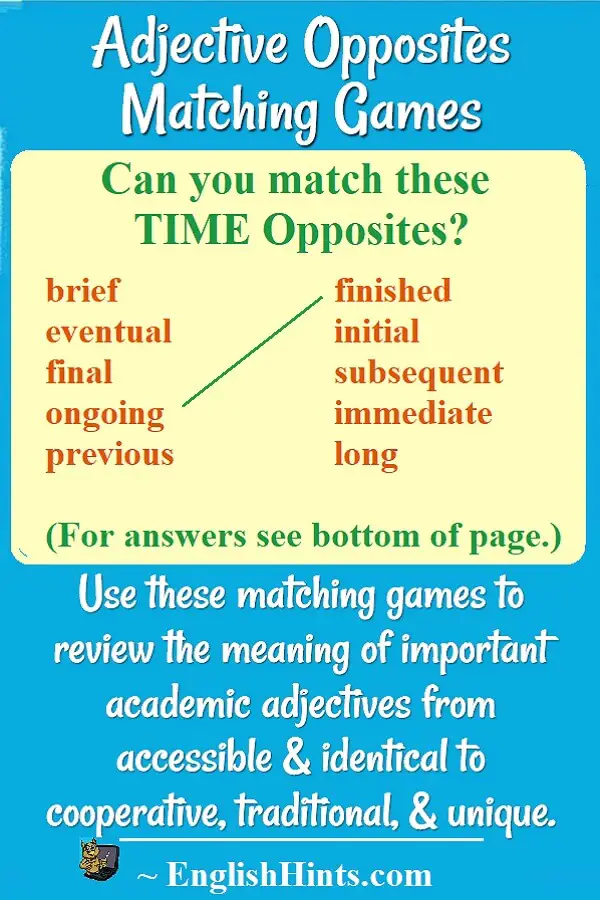Advanced Adjective Opposites Matching Games
Opposite matching games are not only fun; they're also a good way to practice (and even increase) vocabulary. Most beginning language students learn happy and sad, day and night, tall, short, open, close, love, hate, and many other pairs. Contrasts can make the meaning of each word clearer and also help us remember.
The adjectives in these matching games are less common, but quite important for academic reading.
At least one of each pair of the adjective opposites below is from the Academic Word List. (The AWL lists the most common words in academic writing that aren’t on the GSL-- the 2,000 most common English words of all.)
You will probably know quite a few of these, but not all of them.
One way to learn the adjectives you don’t yet know is to make your best guess and then check your answers. However, that can be hard if there are several unfamiliar words in one set.
So I wrote a short essay that demonstrates how some of them can be used. If you find some of the matches difficult, try reading it before you finish matching the opposites.
If you prefer to print these matching exercises to work offline, here is a similar pdf version. (It’s slightly different due to layout requirements online. It includes all four games.)
See These Words in Use: an Essay on Game Programs
Computer game programmers design virtual worlds to feel ‘real’, even if their settings and stories are completely unlike ordinary life. Excitement is crucial to the games’ success, but a realistic story is optional. As long as it’s exciting, it can be realistic -- or about aliens!
Game creators try to make each game unique-- not quite like any other, but also sufficiently similar to earlier games that players will recognize the main idea and want to play it.
The initial (beginning) scenes should give a general idea of the game’s story and its major, dominant themes. Subsequent scenes can develop these themes more specifically.
As the players get deeper into the story they may meet less important, subordinate characters. However, these minor characters and subplots must remain relevant to the main story.
Game designers need to consider how competitive to make their games. Some players are very competitive, and winning is everything. Their pleasure is diminished if they can’t prove they are the best. Other players are more interested in cooperative play with their friends and having a relaxing time together.
Directions for Opposites Matching Games:
Match (connect) the adjective on the left with its opposite in the menu on the right. (You may need to scroll down to see some of the opposites,) Examples: cold- hot or friendly-unfriendly.
| accessible | ||
| flexible | ||
| identical | ||
| liberal | ||
| required | ||
| traditional | ||
| unified | ||
| unique | ||
| variable | ||
| virtual | ||
| concentrated | ||
| cooperative | ||
| dominant | ||
| dramatic | ||
| exposed |
Time Opposites picture answers:
- brief- long
- eventual- immediate
- final- initial
- ongoing- finished
- previous-subsequent
Play other adjective opposite matching games:
- Positive and Negative Adjective Opposites,
- Adjectives for Thinking, or
- Adjectives of Size and Importance.
There are several other matching games (practicing science vocabulary, Latin word roots, and other words) in Vocabulary Games (below
home > Online Vocabulary Games in English > Adjective Opposite Matching Games.
Didn't find what you
needed? Explain what you want in the search box below.
(For example, cognates, past tense practice, or 'get along with.') Click to see the related pages on EnglishHints.
| site search by freefind | advanced |






